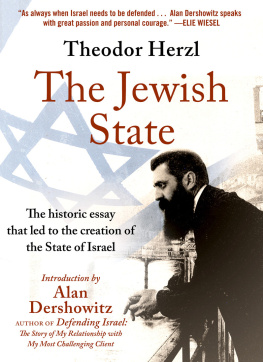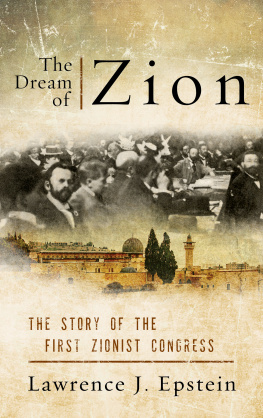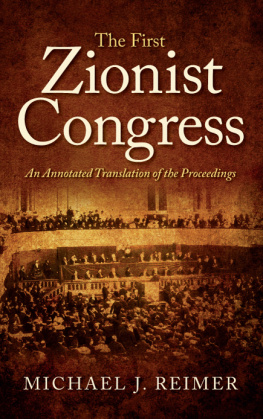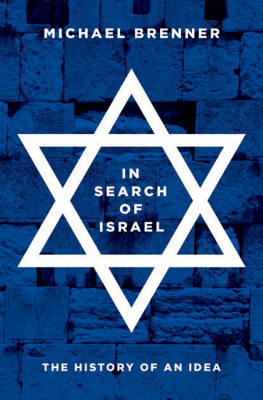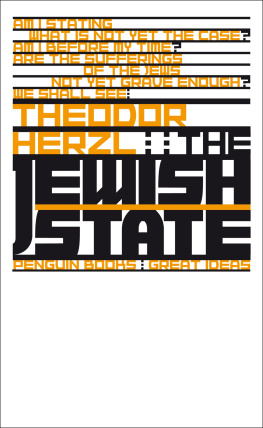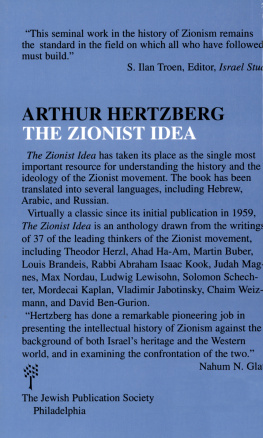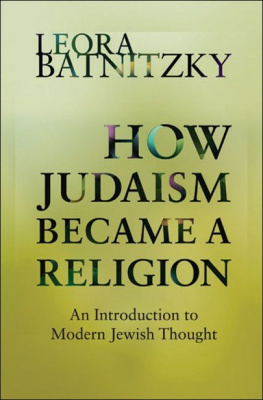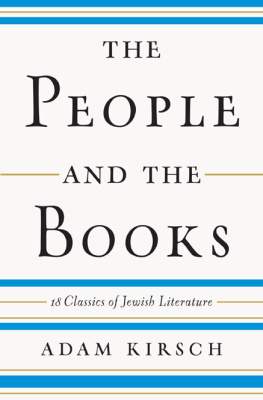Theodor Herzl - The Jewish State
Here you can read online Theodor Herzl - The Jewish State full text of the book (entire story) in english for free. Download pdf and epub, get meaning, cover and reviews about this ebook. genre: Politics. Description of the work, (preface) as well as reviews are available. Best literature library LitArk.com created for fans of good reading and offers a wide selection of genres:
Romance novel
Science fiction
Adventure
Detective
Science
History
Home and family
Prose
Art
Politics
Computer
Non-fiction
Religion
Business
Children
Humor
Choose a favorite category and find really read worthwhile books. Enjoy immersion in the world of imagination, feel the emotions of the characters or learn something new for yourself, make an fascinating discovery.

- Book:The Jewish State
- Author:
- Genre:
- Rating:4 / 5
- Favourites:Add to favourites
- Your mark:
- 80
- 1
- 2
- 3
- 4
- 5
The Jewish State: summary, description and annotation
We offer to read an annotation, description, summary or preface (depends on what the author of the book "The Jewish State" wrote himself). If you haven't found the necessary information about the book — write in the comments, we will try to find it.
The Jewish State — read online for free the complete book (whole text) full work
Below is the text of the book, divided by pages. System saving the place of the last page read, allows you to conveniently read the book "The Jewish State" online for free, without having to search again every time where you left off. Put a bookmark, and you can go to the page where you finished reading at any time.
Font size:
Interval:
Bookmark:
Introduction
It is astonishing how little insight into the science of economics many of the men who move in the midst of active life possess. Hence it is that even Jews faithfully repeat the cry of the Anti-Semites: We depend for sustenance on the nations who are our hosts, and if we had no hosts to support us we should die of starvation. This is a point that shows how unjust accusations may weaken our self-knowledge. But what are the true grounds for this statement concerning the nations that act as hosts ? Where it is not based on limited physiocratic views it is founded on the childish error that commodities pass from hand to hand in continuous rotation. We need not wake from long slumber, like Rip van Winkle , to realize that the world is considerably altered by the production of new commodities. The technical progress made during this wonderful era enables even a man of most limited intelligence to note with his short-sighted eyes the appearance of new commodities all around him. The spirit of enterprise has created them.
Labor without enterprise is the stationary labor of ancient days; and typical of it is the work of the husbandman, who stands now just where his progenitors stood a thousand years ago. All our material welfare has been brought about by men of enterprise. I feel almost ashamed of writing down so trite a remark. Even if we were a nation of entrepreneurssuch as absurdly exaggerated accounts make us out to bewe should not require another nation to live on. We do not depend on the circulation of old commodities, because we produce new ones.
The world possesses slaves of extraordinary capacity for work, whose appearance has been fatal to the production of handmade goods: these slaves are the machines. It is true that workmen are required to set machinery in motion; but for this we have men in plenty, in super-abundance. Only those who are ignorant of the conditions of Jews in many countries of Eastern Europe would venture to assert that Jews are either unfit or unwilling to perform manual labor.
But I do not wish to take up the cudgels for the Jews in this pamphlet. It would be useless. Everything rational and everything sentimental that can possibly be said in their defense has been said already. If one s hearers are incapable of comprehending them; one is a preacher in a desert. And if one s hearers are broad and high-minded enough to have grasped them already, then the sermon Is superfluous. I believe in the ascent of man to higher and yet higher grades of civilization; but I consider this ascent to be desperately slow. Were we to wait till aver age humanity had become as charitably inclined as was Lessing when he wrote Nathan the Wise, we should wait beyond our day, beyond the days of our children, of our grandchildren, and of our great-grandchildren. But the world s spirit comes to our aid in another way.
This century has given the world a wonderful renaissance by means of its technical achievements; but at the same time its miraculous improvements have not been employed in the service of humanity. Distance has ceased to be an obstacle, vet we complain of insufficient space. Our great steamships carry us swiftly and surely over hitherto unvisited seas. Our railways carry us safely into a mountain-world hitherto tremblingly scaled on foot. Events occurring in countries undiscovered when Europe confined the Jews in Ghettos are known to us in the course of an hour. Hence the misery of the Jews is an anachronism not because there was a period of enlightenment one hundred years ago, for that enlightenment reached in reality only the choicest spirits.
I believe that electric light was not invented for the purpose of illuminating the drawing-rooms of a few snobs, but rather for the purpose of throwing light on some of the dark problems of humanity. One of these problems, and not the least of them, is the Jewish question. In solving it we are working not only for ourselves, but also for many other over-burdened and oppressed beings.
The Jewish question still exists. It would be foolish to deny it. It is a remnant of the Middle Ages, which civilized nations do not: even yet seem able to shake off, try as they will. They certainly showed a generous desire to do so when they emancipated us. The Jewish question exists wherever Jews live in perceptible numbers. Where it does not exist, it is carried by Jews in the course of their migrations. We naturally move to those places where we are not persecuted, and there our presence produces persecution. This is the case in every country, and will remain so, even in those highly civilizedfor instance, Franceuntil the Jewish question finds a solution on a political basis. The unfortunate Jews are now carrying the seeds of Anti-Semitism into England; they have already introduced it into America.
I believe that I understand Anti-Semitism, which is really a highly complex movement. I consider it from a Jewish standpoint, yet without fear or hatred. I believe that I can see what elements there are in it of vulgar sport, of common trade jealousy, of inherited prejudice, of religious intolerance, and also of pretended self-defense. I think the Jewish question is no more a social than a religious one, notwithstanding that it sometimes takes these and other forms. It is a national question, which can only be solved by making it a political world-question to be discussed and settled by the civilized nations of the world in council.
We are a peopleone people.
We have honestly endeavored everywhere to merge ourselves in the social life of surrounding communities and to preserve the faith of our fathers. We are not permitted to do so. In vain are we loyal patriots, our loyalty in some places running to extremes; in vain do we make the same sacrifices of life and property as our fellow-citizens; in vain do we strive to increase the fame of our native land in science and art, or her wealth by trade and commerce. In countries where we have lived for centuries we are still cried down as strangers. and often by those whose ancestors were not yet domiciled in the land where Jews had already had experience of suffering. The majority may decide which are the strangers ; for this, as indeed every point which arises in the relations between nations, is a question of might. I do not here surrender any portion of our prescriptive right, when I make this statement merely in my own name as an individual. In the world as it now is and for an indefinite period wilt probably remain, might precedes right. It is useless, therefore, for us to be loyal patriots, as were the Huguenots who were forced to emigrate. If we could only be left in peace....
But I think we shall not be left in peace.
Oppression and persecution cannot exterminate us. No nation on earth has survived such struggles and sufferings as we have gone through. Jew-baiting has merely stripped off our weaklings; the strong among us were invariably true to their race when persecution broke out against them. This attitude was most clearly apparent in the period immediately following the emancipation of the Jews. Those Jews who were advanced intellectually and materially entirely lost the feeling of belonging to their race. Wherever our political well-being has lasted for any length of time, we have assimilated with our surroundings. I think this is not discreditable. Hence, the statesman who would wish to see a Jewish strain in his nation would have to provide for the duration of our political well-being; and even a Bismarck could not do that.
For old prejudices against us still lie deep in the hearts of the people. He who would have proofs of this need only listen to the people where they speak with frankness and simplicity: proverb and fairy-tale are both Anti-Semitic. A nation is everywhere a great child, which can certainly be educated; but its education would, even in most favorable circumstances, occupy such a vast amount of time that we could, as already mentioned, remove our own difficulties by other means long before the process was accomplished.
Next pageFont size:
Interval:
Bookmark:
Similar books «The Jewish State»
Look at similar books to The Jewish State. We have selected literature similar in name and meaning in the hope of providing readers with more options to find new, interesting, not yet read works.
Discussion, reviews of the book The Jewish State and just readers' own opinions. Leave your comments, write what you think about the work, its meaning or the main characters. Specify what exactly you liked and what you didn't like, and why you think so.

